May 19, 2016
Edited by David Sanders
Specimen Days
1883— Henricus WJM Keuls, Dutch lawyer/poet (Dancing Lamp), is born.
1895 —Jose J Marti y Perez, Spanish/Cuban poet (Versos sencillos), dies.
1971— Ogden Nash, poet, dies at 68.
1984 —John Betjeman, poet (Mount Zion) and English Poet Laureate (1972-1984), dies at 77.
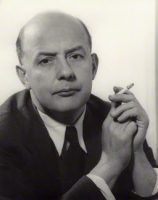
Indifferent the finches sing,
Unheeding roll the lorries past:
What misery will this year bring
Now spring is in the air at last?
For, sure as blackthorn bursts to snow,
Cancer in some of us will grow,
The tasteful crematorium door
Shuts out for some the furnace roar;
But church-bells open on the blast
Our loneliness, so long and vast.
—from “Loneliness” by John Betjeman (1906–1984)
“What misery will this year bring / Now spring is in the air at last?” —from “Loneliness” by John Betjeman (1906–1984)
World Poetry
Scientists Use Advanced Astronomical Software to Date 2,500 Year-old Lyric Poem
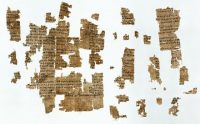
Physicists and astronomers from the University of Texas at Arlington have used advanced astronomical software to accurately date lyric poet Sappho's "Midnight Poem," which describes the night sky over Greece more than 2,500 years ago.
German Court Rejects Erdogan's Attempt to Shut Up Critical Publisher
A Cologne court refused to grant an injunction against the chief executive of leading publishing house Axel Springer, Mathias Doepfner, at the behest of Tayyip Recep Erdogan. Doepfner penned an open letter in support of a satirist mocking the Turkish leader. "The defendant has a right to free expression of opinion," said a statement from the court, following Tuesday's hearing.
Palestinian Refugee Poet Rafeef Ziadah to Perform in Dublin’s Abbey Theatre as Part of her Irish Tour

Due to unprecedented demand, world-renowned Palestinian poet Rafeef Ziadah’s show “We Teach Life” in the International Literature Festival Dublin has been moved from the Peacock to the main stage of Dublin’s Abbey Theatre at 8pm on Sunday 22nd May.
Dylan Thomas GP's Memoir Reveals "Shy and retiring" Poet
Newly-discovered documents have cast doubt on Dylan Thomas' reputation as a hard-drinking womaniser. The poet is described as "shy and retiring" in a previously unseen memoir written by the Thomas family's GP. Prof John Goodby, of Swansea University, who discovered the documents, said they confirmed the poet's life in Wales "wasn't sensational”. "He was fairly modest, he was sober," said Prof Goodby.
Scientists from the University of Texas at Arlington have used advanced astronomical software to date lyric poet Sappho’s “Midnight Poem.”
Recent Reviews
The Mystery of Emily Dickinson
by Christopher Benfey
To prepare a new edition of a poet’s work, a scholar may spend years in the archives, weeding out the “corruptions” planted by previous editors and scribes, only to see his own decisions denounced by the next generation of editors. In his poem “The Scholars,” W. B. Yeats saw a comic contrast between the passionate poet and the painstaking editor.
To prepare a new edition of a poet’s work, a scholar may spend years in the archives, weeding out the “corruptions” planted by previous editors and scribes.
Broadsides
Adrienne Rich’s Poetic Transformations
by Claudine Rankine
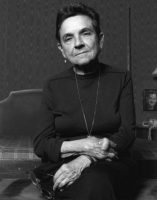
There are many great poets, but not all of them alter the ways in which we understand the world we live in; not all of them suggest that words can be held responsible. Remarkably, Adrienne Rich did this, and continues to do this, for generations of readers.
The Long Distance Between Poems
by Jericho Brown
In the church where I was raised, adults made a sharp distinction between joy and happiness. Happiness felt good, but it was temporary, and because it was temporary, there was something about it not to be trusted. Happiness, therefore, had a relationship: with easy money so often lost as soon as it was pocketed, or with the applause that comes at the end of a song, or with the entanglements of sex and orgasm. Joy, on the other hand, was a deeper and long-lasting feeling.
Claudia Rankine on Adrienne Rich’s poetic transformations.
Drafts & Fragments
New Pablo Neruda Movie Recounts Poet's Dramatic Bid for Freedom

The poems that won Pablo Neruda the Nobel prize for literature may never have been seen if the writer had not been such a good horseman. A new film, “Neruda” – which will be shown Friday at the Cannes film festival – tells of the period in the Chilean icon’s drama-packed life when he nearly drowned in a river while fleeing on horseback from anti-communist police.
Google’s AI Writes Some Really Weird, Depressing ‘Poetry’
by Cam Bunton
You may remember a little while back it was revealed that Google has been feeding its neural networks steamy romance novels to read. The aim through this exercise was to teach it to produce more human-like responses in order to power its search results and ‘smart reply’ systems. As well as forcing its neural networks to digest more than 11,000 unpublished books (3,000 of which were romance), Google Brain’s engineers have also been teaching it to relate two unique phrases to each other. As revealed in a Quartz article, the method was fairly
A new film, “Neruda” – which will be shown Friday at the Cannes film festival – tells of the Chilean icon’s drama-packed life.
Poetry In the News
Michael S. Harper, Poet With a Jazz Pulse, Dies at 78

Michael S. Harper, whose allusive, jazz-inflected poems interwove his personal experiences as a black man with an expansive view of a history shared by black and white Americans, and who was a finalist for the National Book Award in poetry in 1978, died on Saturday in Rhinebeck, N.Y. He was 78.
Poem by Hipster Hero Angers Barcelona Police
Police in Barcelona are up in arms about the placement of a street poster containing an "offensive" work by American poet Charles Bukowski. The poster of the Bukowski poem ‘4 cops’ is part of a week-long poetry event in the capital of Spain’s Catalonia region, and one of many such installations that can be found around the city at the moment. But the decision to place a Spanish translation of ‘4 cops’ right outside national police headquarters in the city has caused a stir.
The Lost Gardens of Emily Dickinson
Archaeologists are excavating the grounds of the home where the poet lived in hopes of restoring her botanical treasures.
Michael S. Harper, poet with a jazz pulse, dies at 78.
New Books
The City Keeps: Selected and New Poems 1966-2014 by John Godfrey
[Paperback] Wave Books, 304 pp., $25.00
John Godfrey's masterful body of work has sustained its attentive, lovesick, unruly energy for over fifty years. The City Keeps brings together the best poems from his thirteen collections, plus some previously uncollected. "Dedicated to those who people the City of New York," Godfrey's work is populated, elusive, and geometric, but also full of tenderness and light
Songs from a Mountain by Amanda Nadelberg
[Paperback] Coffee House Press, 112 pp., $16.00
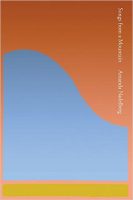
"Amanda Nadelberg's poems . . . are jumping, funny, romantic, and frequently lyrical….which in the immediate reading is almost pure music."—Ken Tucker, Entertainment Weekly
Cinepoems and Others by Benjamin Fondane
[Paperback] NYRB Poets, 240 pp., $14.95
Benjamin Fondane was that rarest of poets: an experimental formalist with a powerful lyric poetic voice; a renegade surrealist who was also a highly original existential philosopher; a self-consciously Jewish poet of diaspora and loss, whose last manuscripts made it out of Drancy in 1944 just before his deportation to Auschwitz-Birkenau, where he was murdered, yet whose poetry speaks of an overflowing plenitude. This bilingual selection is the first volume of Fondane’s poetry to appear in English, and it includes a broad sample of his work, from the coruscating and comic cinepoems of his surrealist years, to philosophical meditations, to poems that in their secular and mystical Judaism confront the historical calamity—and imaginative triumph—of European Jewry.
The Road In Is Not the Same Road Out: Poems by Karen Solie
[Paperback] Farrar, Straus and Giroux, 128 pp., $15.00
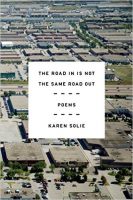
In Solie's new collection, The Road In Is Not the Same Road Out, she restlessly excavates our civilization, the moments of tough luck, casual violence, naked desire, and inchoate menace, pursuing "Beauty and terror / in equal measure" and fixing on the "Intrigue of a boarded-up building. / We want to get in there and find out what's the matter with it." Amplifying the elegant recklessness of her Griffin Poetry Prize-winning collection Pigeon, these poems bear an uncanny poetic intelligence and unflinching vision.
In Karen Solie’s new collection, “The Road In Is Not the Same Road Out,” she restlessly excavates our civilization, casual violence, & naked desire.
Correspondences
I, Your Perfect Muse
Karen Lepri interviews Dawn Lundy Martin
by Karen Lepri

Dawn and I had the chance to “GChat,” in person, about her newest collection of poetry, Life in a Box is a Pretty Life (Nightboat Books, $15.95 [paper]), one cool, cloudy October day at her house in the Hamptons, just down the road from Jackson Pollock’s old studio. We wanted to do an interview that had a time limit, that included the immediacy of the present, rather than tinkering with responses for days. But we also wanted the freedom of typing, not having to transcribe later
The Rumpus Interview with Cole Swenson
by Maria Anderson
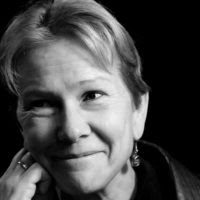
Cole Swensen is the author of fifteen collections of poetry, most recently, Gravesend and Landscapes on a Train, as well as a chapbook, Walk. Her work has won the Iowa Poetry Prize, the New American Writing Award, and the National Poetry Series and has been a finalist for the National Book Award and twice for the Los Angeles Times Book Award. A 2006 Guggenheim Fellow, she is the co-editor of the 2009 Norton anthology, American Hybrid, and the founding editor of La Presse. Also a translator, she won the 2004 PEN USA Award in Literary Translation. Swensen has taught at the University of Denver and the Iowa Writers’ Workshop, and currently teaches at Brown University. She divides her time between Paris and Providence, RI. We spoke through email about walking and her recent travels.
Piercing Clarity: Gail Mazur’s Poetry
by John Yau

Aptly titled, Forbidden City is Gail Mazur’s seventh book of poetry. Before getting the book — which she sent me — I knew that Gail had written the poems in the years after her husband, Michael Mazur (1935–2009), had died of congestive heart failure. I met Gail and Michael in 1972, shortly after I graduated from Bard College and moved to Allston, Massachusetts, a city I was familiar with, having grown up in the Brookline, the next town. In 1975, I moved to New York City, glad to leave this world behind.
Maria Anderson interviews Cole Swenson for The Rumpus.
Envoi: Editor’s Notes
Along with the new Neruda movie mentioned above, there is also, of course, a new book of “lost” poems from Copper Canyon, Then Come Back, translated by Forrest Gander. While it is difficult to find poems from the book on line, here is a link to a broadside of one of the poems: http://thenorthpress.net/events-news-blog.html
Enjoy.